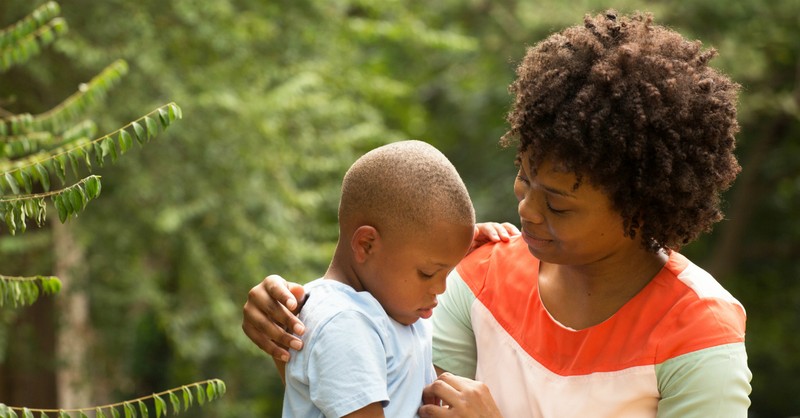
Children make us laugh, cry, smile. They have the power to bring us joy or heartache. We do a lot for them, and they in turn do a lot for us.
Parents have the delicate tasks of teaching their children how to undertake lives full of faith, hope, and love.
“Iron sharpens iron, and one person sharpens another.” (Proverbs 27:17)
Children are born into a world ripe with sin. Though they have the capacity to do good, they will not always make the right decisions on their own. Whether or not a child lives a life of good or bad is largely influenced by the impact of their parenting.
After years of work with at-risk youth, a children’s museum, and a day care, I have witnessed first-hand the effects of parenting on youth. The difference between a child who feels loved by parents and another who isn’t, is apparent in almost every action and word.
There are plenty of books on how to properly raise children, but if a recommendation is to be made, the Bible is the best option. The Bible captures all the lessons needed to be like Jesus, something every adult and child should aspire toward—and something those parenting books are not usually centered on.
If you are seeking to raise your children to be exceptional, then don’t neglect to teach them these following lessons from Scripture.
Here are 5 rules of life most parents don’t teach their children (and how to be the exception).
Photo Credit: © Getty Images/DGLimages4

1. Express Gratitude...Constantly
Children utter the words “Thank you,” usually when they get something they asked for or want. If they didn’t ask for it or want it, they may forget. Sometimes parents remind them. Sometimes they don’t.
While we should all love without putting conditions on our love, children should learn the importance of expressing gratitude all the same.
The Bible talks a lot about gratitude in relation to God, our human relationships, and all of life’s blessings and sufferings.
“Rejoice always; pray without ceasing; in everything give thanks: for this is the will of God in Christ Jesus to you-ward.” (1 Thessalonians 5:16-18)
Children who learn the significance of gratitude are better able to maintain an appreciation of God and others. Even when life is challenging, they will be able to persevere knowing they have plenty in life to enjoy.
Photo Credit: © Getty Images/yacobchuk

2. Accept “No”
The Internet is on demand, television is on demand, music is on demand. Food is starting to become on demand. There are fewer and fewer things in life that keep us waiting. The less we have to wait, the less patience we need to get through life.
The issue of instant gratification is present among children too.
Then what happens when children can’t get what they want? What happens when they hear “no”? Or when they have to wait?
Children, like adults sometimes can’t accept not having their way. They throw temper tantrums and act out.
I remember hearing an administrator at the day care say that we shouldn’t say no to a particular child. Her fear was that he doesn’t handle hearing that word well. Sadly, I do not believe she imagined him as an adult, living with an inability to hear “no."
This is a valuable lesson for children because not only do parents need to say no to maintain authority in their house, but sometimes God himself says no to us.
Hearing no from God can make the difference between living a life devoted to Him or a life of sin.
“Trust in the Lord with all your heart, and do not rely on your own understanding; in all your ways know him, and he will make your paths straight.” (Proverbs 3:5-6)
Just as the Bible instructs believers to abstain from sin and to turn toward God, children should be encouraged to flee sin too. If children choose self instead of God, they will find themselves on a path that is far from straight.
Photo Credit: © Getty Images/digitalskillet

3. Love Others
Without a doubt, my observations of children lead me to believe that children are much faster to forgive and more willing to be vulnerable than adults.
That being said, children often reserve this love for people closest to them and anyone not in their circle does not get the benefits of their love. They reserve so much of their love that they may go so far as to avoid interactions with unfamiliar children.
“Love your neighbor as yourself.” (Matthew 22:39)
Love can be as simple as saying hello to a stranger or inviting someone to participate in a game. Stranger danger is a valuable lesson when applied to adults, though this idea can become detrimental in schools when children feel like they should avoid others because they “don’t know them.”
The only way to become friends is to establish a relationship. The only way to show love is in relationship.

4. Learn about Responsibility
There’s a common trend between adults and children who claim they “didn’t do it.” They lack responsibility, and thus, place their shortcomings on others or circumstances. Never on themselves.
Adults are not as impressionable as kids, so learning a lesson like responsibility at a young age will make for an easier life later.
“Start a youth out on his way; even when he grows old he will not depart from it.” (Proverbs 22:6)
Children who learn to hold themselves accountable for their actions are more likely to repent for their sins. After all, repentance requires acknowledgement of a wrong. Without responsibility, there is no acknowledgement.
Photo Credit: © Getty Images/Jacob Wackerhausen

5. Be Teachable...Always
God wants to bless you with the know-how to get through life. This applies to our children too. He uses us to dispense this knowledge to them. If we want to be the best teachers for our children, we have to first be teachable.
“Now if any of you lacks wisdom, he should ask God—who gives to all generously and ungrudgingly—and it will be given to him.” (James 1:5)
Children are often teachable, but lose their ability to learn as they grow older. School ceases, learning decreases, and ideas that were formed become more permanent.
If we want to continuously grow in our ability to be more like Jesus, we have to always remain teachable. From children, to adult, to elder, there is always something new to learn from God.
Photo Credit: © Getty Images/digitalskillet

Be the Exception
No one is perfect “for all have sinned, and fall short of the glory of God” (Romans 3:23). This applies to every parent and child. Though everyone is bound to make mistakes, we can all still strive to be more like Jesus.
This includes trying to be a better parent. The better you are at parenting, the better your chances of raising God-fearing children.
By following these 5 rules of life, not only will you become an exceptional parent, your children will become exceptional. Then they too, in time, may become exceptional parents.
Photo Credit: © Getty Images/Martinan
Originally published Monday, 28 September 2020.




